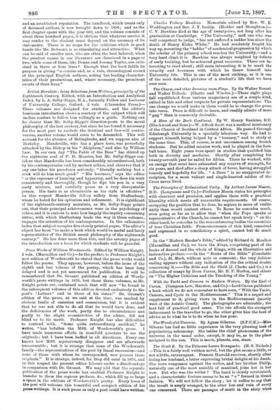The Principles of Ecclesiastical Unity. By Arthur James Mason, D.D.
(Longma.ns and Co.)—Professor Mason states his principles with clearness and precision, and applies them with a practical liberality which meets all reasonable requirements. Of course, occupying the position that he does, he aspires to more of visible unity than would content others. To Rome he concedes much, even going so far as to allow that "when the Pope speaks as representative of the Church, he cannot but speak truly ; " on the other hand, he concedes to the nonconforming bodies the essentials of true Christian faith. Pronouncements of this kind, conceived and expressed in so conciliatory a spirit, cannot but do much
Po&
In the "Modern Reader's Bible," edited by Richard G. Moulton (Macmillan and Co.), we have the Kings, comprising part of the books of Samuel and the whole of Kings, with an illustrative and instructive preface.—In the "Books of the Bible" (Constable and Co.), St. Mark, without note or comment; the very dubious ending appears without any indication of the the critical doubts concerning it.—The Bible and the Child (J. Clarke and Co.) is a collection of essays by Dean Farrar, Mr. R. F. Horton, and others on "The Higher Criticism and the Teaching of the Young."


































 Previous page
Previous page